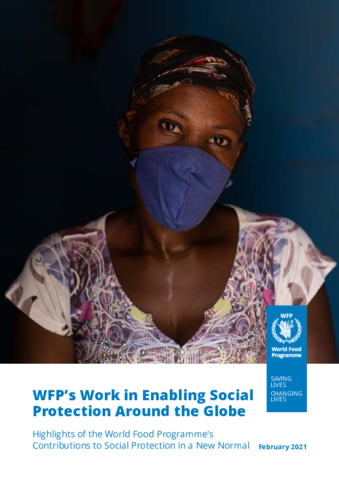
This report looks at WFP’s work in social protection after a tumultuous year since the beginning of the COVID-19 pandemic. Through a collection of 10 country examples, it unpacks how WFP’s long-term support to governments enabled better social protection.
This report looks at WFP’s work in social protection after an unfathomably complex and tumultuous year since the beginning of the COVID-19 pandemic. Governments around the world responded promptly to mitigate COVID-19’s socioeconomic impacts and protect the most vulnerable segments of their populations. However, despite the leadership of governments and strong collaborative efforts with the international community, it is clear that most countries’ social protection systems were not ready for this crisis.
WFP’s ability to provide immediate support to governments’ social protection responses in this unique situation has been made possible by our long-standing engagements with national actors. Through a collection of 10 country examples, we unpack how WFP’s long-term support to governments enabled better coverage, comprehensiveness, adequacy and quality of social protection.
Highlighting experiences from around the world, this report focuses on five areas of work that have merited particular attention. These range from shock-responsiveness and inclusion to food security and nutrition-sensitive social protection, building national systems in fragile contexts and the provision of digital advisory services.
| Document | File |
|---|---|
| WFP’s Work in Enabling Social Protection in Bangladesh - 2021 |
PDF | 460.27 KB
Download
|
| WFP’s Work in Enabling Social Protection in Colombia - 2021 |
PDF | 413.01 KB
Download
|
| WFP’s Work in Enabling Social Protection in Colombia - 2021 - Spanish version |
PDF | 402.35 KB
Download
|
| WFP’s Work in Enabling Social Protection in the Dominican Republic - 2021 |
PDF | 528.29 KB
Download
|
| WFP’s Work in Enabling Social Protection in the Dominican Republic - 2021 - Spanish version |
PDF | 494.23 KB
Download
|



